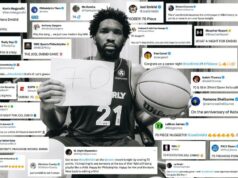When Manu Ginobili entered the NBA a decade ago, a bundle of frenetic energy and reckless abandon, it was thought that his career would be short-lived; like a star that burned brilliantly, but damned to burn out quickly. He was dubbed El Contusion—a man without fear, or regard for his own body. Of the San Antonio Spurs’ three foundational pieces, Ginobili was always the one we enjoyed on borrowed time.
As much as he’s become San Antonio’s favorite adopted son, he belongs to Argentina. When the time comes for him to cast off his black and silver, it will likely be the colors of his nation’s flag that he returns to.
That time will likely have to wait, however, as Ginobili wrote in the Argentinean newspaper La Nación that he plans to return to the Spurs for at least one more season:
“The future? After thinking about it a lot, and going over and over the bad moments that passed, I feel better and happy for the great season despite the outcome, and it is very difficult [to believe] that I am not going to continue playing. I do not think I'm so exhausted and frustrated with basketball to say, "Enough." I don't know altogether, I haven't made a decision, but I see it as unlikely that I will not play anymore.”
– Manu Ginobili (hat tip Express-News)
For years Ginobili defied the odds, outwitting opponents, time, and at times, even the laws of physics through a combination of guile, skill, and sheer determination. But age catches us all eventually. This past season the bald spot shone through a little more prominently, and the bruises once worn as badges of honor kept him out action a little longer than usual. Ginobili missed 22 games with a variety of ailments—most notably back and hamstring issues—scoring just 11.8 points per game, the fewest since his rookie season.
We often call what Ginobili has done on the court over the course of his career magic, but only because it defies our understanding what should be possible with a basketball. His basketball IQ and creativity are magnificent, which has been both a bane and a blessing. Ginobili sees things on the court that no one else does, and the calculations often whirl through his mind faster than his body can keep up with, leading to decisions not even his coach can explain. The same thought processes that enabled Ginobili to produce a 24-point, 10-assist performance in Game 5 of the NBA Finals also led to four turnovers in the fourth quarter of Game 7.
Yes, Ginobili sees many things on the court, and it’s become quite obvious for everyone to see that there isn’t much time left in one of the NBA’s great career. He’ll be 36 when next season begins, and with all the mileage on his body, his muscles have trouble keeping up with his basketball synapses, blurring the lines between creativity and chaos that Ginobili once tiptoed so masterfully.
Though the long, flowing mane and 40-point scoring outbursts might be gone, even in a reduced capacity, Ginobili holds significant value to the  Spurs.
Spurs.
 Spurs.
Spurs.
In San Antonio, coach Gregg Popovich has crafted a system that ties together everything the Spurs do. But it’s the dash of unpredictable chaos that Ginobili interjects that has always pushed the Spurs to new heights.
Tim Duncan, and to a lesser extent, Tony Parker, are both system players. That is to say while both are extremely effective, an opposing coach can game plan for what each is going to do, account and budget for their production, and adjust their game plans accordingly. The rest of the team, with perhaps the exception of Kawhi Leonard, derive their roles and production from within that system.
But Ginobili has never been bound by anything except his own imagination and the limitations of his own body. Though the first makes him dangerous to even the Spurs, and the latter has grounded him even more, he can still provide and edge that’s hard to account for and keeps defenses honest against the Spurs system.
“What makes him probably most dangerous is the unpredictability, his ability to be aggressive and do things on the court that aren’t necessarily scripted,” Heat coach Erick Spoelstra said. “That’s where he’s most dangerous. He’s tough to game plan for.”
With his rash of fourth quarter turnovers in Game 7, it’s easy to forget that he also scored 18 points on 12 shots, and was the Spurs only effective source of ball handling with Parker struggling through LeBron James’ defense and an ailing hamstring.
His role, and salary, will have to be readjusted some to reconcile with his new realities. Ginobili has worked as the Spurs de facto backup point guard for the past two seasons (since T.J. Ford retired due to a serious spinal condition), and asking him to operate in that capacity in large stretches again an elite defense like Miami or Memphis can be a recipe for disaster.
A playmaking backup point guard would allow Ginobili to operate off the ball, attacking defenses from the peripheries, where his mind can make up for his aging legs. And there is some precedence for how effective he can be in that role in his time playing next to an effective Parker in Game 5.
If Leonard has eclipsed Ginobili as the third most important player on the team, there still remains enough magic left to make vital contributions to it. So long as his craftiness, instincts, jumper, and body hold up, there still remains enough of Ginobili to fulfill his role—which has been to hold the Spurs’ system together by operating outside of it.





